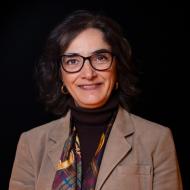Short CV
 Elvira Fortunato is Vice‐Rector at Nova University since September 2017, Director of the Materials Research Center (CENIMAT) and the integrated Associate Laboratory i3N, the Institute of Nanostructures, Nanomodeling and Nanofabrication (The only Portuguese research centre (1998-…) classified as Exceptional in the Advanced Materials and Nanotechnologies area in the last national evaluation); Invited Professor at Universidade Federal de Lavras, Brazil (2013-…).
Elvira Fortunato is Vice‐Rector at Nova University since September 2017, Director of the Materials Research Center (CENIMAT) and the integrated Associate Laboratory i3N, the Institute of Nanostructures, Nanomodeling and Nanofabrication (The only Portuguese research centre (1998-…) classified as Exceptional in the Advanced Materials and Nanotechnologies area in the last national evaluation); Invited Professor at Universidade Federal de Lavras, Brazil (2013-…). She has held other Institutional Responsibilities, such as, Deputy Director of FCT NOVA (2014-17); Coordinator of Research Centers of FCT NOVA (2006-17); Member of the Executive Board of the Materials Science Department (2009-17); Coordinator of the Doctoral Programme in Nanosciences and Nanotechnology, FCT NOVA (2009-18); Member of the Scientific Committee of the PhD Program in Biomaterials (UFLA, Brasil) (2014-…). Participation in several academic examination referees board (PhD juries in and abroad Portugal).
She has received her Bachelor´s degree in Physics and Materials Engineering in 1987, obtaining, in 1995, the PhD in Microelectronics and Optoelectronics.
Elvira Fortunato pioneered European research on transparent electronics, namely thin-film transistors based on oxide semiconductors, demonstrating that oxide materials may be used as true semiconductors. She is co-inventor of the paper electronics concept worldwide: Paper-e®. In 2008 she wins an Advanced Grant from the European Research Council (ERC) for the project “Invisible” and in 2018 she received the second one ERC, with the amount of € 3.5 million. The project is entitled "Multifunctional Digital Materials Platform for Smart Integrated Applications | DIGISMART".
Her research team is exploring novel active properties in advanced and sustainable multifunctional materials, including oxides as well as novel electronic-active materials including alternative deposition methods, with the main objective of developing eco-friendly technologies and devices to be used and exploited in electronic circuits made of stable amorphous semiconductors able to serve large area smart flexible and conformable surface electronics.
She has been distinguished with several National and International Prizes, among those it is worth mentioning the title of Doctor Honoris Causa, in 2009, by University of Galati, and the denomination of Grand Officer of Order of Prince Henry the Navigator, acknowledged by the President of the Republic of Portugal in 2010, the Blaise Pascal Medal conferred by the European Academy of Sciences, 2016, the Czochralski Medal (Science of Materials) assigned by the Polish Academy of Sciences in 2017, Award women of the year Science Category LUX in 2018, and the Honourable Mention of the Scientific Prize of City of Almada in 2019, European Commision's Horizon Impact Award 2020, September 2020, and the award of the Pessoa 2020 Prize.
She is an elected member of the Materials Research Society (1987), Portuguese Materials Society (1990), Portuguese Professional Engineering Association (1990), Portuguese Engineering Academy (2008), European Academy of Sciences (2016), Portuguese Physics Society (2017), Lisbon Academy of Sciences (2018), Member Academia Europaea (2019). She belongs to the Board of Trustees of the Luso‐American Development Foundation (2014).
Former Chief Scientific Advisor of the European Commission, between 2016 and 2020.
She is coordinating since 2019 at NOVA University the SPEAR project, an European platform for supporting and implementing plans for gender equality in academia and research.
Editorial Advisory Board Member of ACS Applied Materials & Interfaces ACS-AMI (2020-2022), Editorial Board of IEEE Electron Device Letters (2020).
Among these years, she has participated as Plenary, Keynote and Invited Speaker, in several International and National events.
Photo Credits Rodrigo Mendes | MadreMedia
